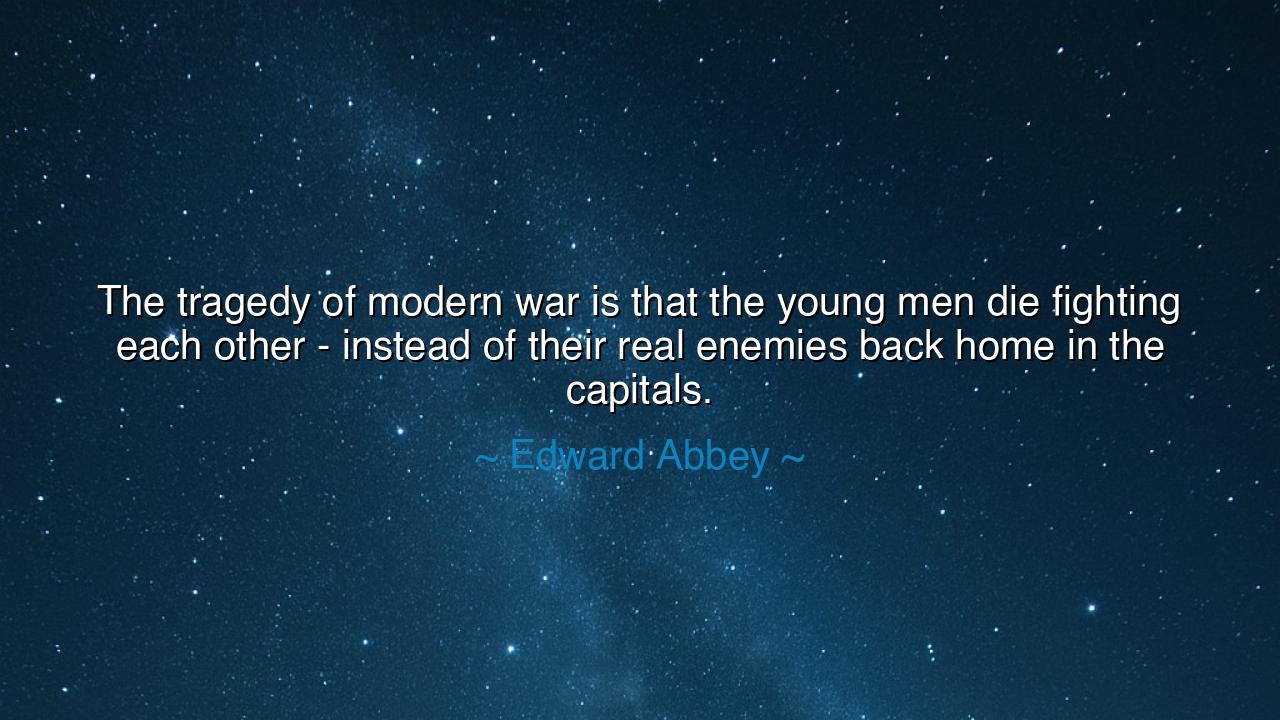
The tragedy of modern war is that the young men die fighting each
The tragedy of modern war is that the young men die fighting each other - instead of their real enemies back home in the capitals.






In the fierce and mournful words of Edward Abbey, “The tragedy of modern war is that the young men die fighting each other – instead of their real enemies back home in the capitals,” there resounds an ancient lament, one as old as civilization itself. Abbey, ever the rebel philosopher, speaks not merely of the horrors of battle, but of the deception that sustains it—the grim truth that wars are often born not from the will of the people, but from the ambitions of the powerful. In his voice echoes the cry of every generation that has watched its youth perish for causes they did not create, for glories they will never taste, and for leaders who will never bleed beside them.
The meaning of Abbey’s quote lies in the terrible inversion of justice that modern war represents. Once, men fought to defend their homes, their freedom, their families; now, they are sent across oceans to kill strangers who, like themselves, are only obeying orders. The tragedy is not only in the death, but in the misdirection of courage. The young, noble in heart and strong in body, are set against one another by those who remain untouched by their sacrifice. The real enemies—the corrupt politicians, the greedy industrialists, the merchants of fear—sit in safety, building their power upon the bodies of the fallen. Thus, war becomes not a defense of the people, but a betrayal of them, a theater where the brave perish to protect the comfort of the cunning.
The origin of Abbey’s thought can be traced to his lifelong opposition to hypocrisy and exploitation. A defender of the land and a critic of authority, he saw how modern societies often disguise greed as patriotism and dominion as duty. His words recall the wisdom of the ancient prophets and philosophers who warned that when rulers lose virtue, they will send others to die for their sins. In ancient Rome, the poet Juvenal wrote that wars are fought for “a handful of silver and the dreams of power,” while in later centuries, soldiers from every nation learned the same truth in trenches and deserts alike. Abbey’s statement is not born from cowardice but from clarity—from the understanding that the true battlefield is not between nations, but between truth and deception, justice and ambition, humanity and the machinery of power.
Consider the tragic story of World War I, the “war to end all wars.” Millions of young men marched into the mud of Europe, believing they fought for honor and civilization. But as the years dragged on, as the gas filled the air and the dead filled the earth, it became clear that they were dying for empires, not ideals. The men in the trenches—German, French, British, American—shared the same hunger, the same fear, the same longing for home. Yet they were made to see one another as monsters, while the true architects of their misery dined in gilded rooms, far from the roar of artillery. In that endless slaughter, the truth of Abbey’s words is written in blood: the real enemies were not across the line, but above it.
Abbey’s warning also speaks beyond the battlefield. He reminds us that war itself begins long before the first shot is fired. It begins in greed, in the boardrooms of those who profit from conflict, in the speeches of those who stir hatred for gain, in the apathy of citizens who do not question the hands that hold power. When young men kill each other, it is often because they have been deceived into believing that their fellow human beings are their foes. And thus, the same pattern repeats through the ages: the poor fight the poor, while the rich grow richer; the innocent die, while the guilty write history. The tragedy is not only that they die—but that they die misled.
Yet, amid this sorrow, Abbey’s words also carry a challenge. He calls upon us to see clearly, to pierce through the illusions that divide us. The true revolution, he implies, is not fought with guns, but with consciousness. It begins when we refuse to be manipulated by those who thrive on division, when we recognize that the stranger we are told to hate is often our mirror—a fellow human, longing for peace, ensnared by the same systems of power. The courage that once served war must now serve truth; the discipline that once obeyed orders must now question them. This is the warfare of the spirit, the rebellion of awareness against the tyranny of deceit.
So, dear listener, the lesson is this: do not let your heart be weaponized. Question the motives of those who call for blood but will never spill their own. Seek peace not as weakness, but as strength—the strength to stand against manipulation, to see through the veils of propaganda, to love where you are told to hate. The greatest victory is not in destroying enemies, but in refusing to become one. For as long as young men die for the ambitions of the old, and as long as the innocent perish for the pride of the powerful, the tragedy of war will endure.
Thus, the words of Edward Abbey are both condemnation and call to awakening. They remind us that war is not destiny, but design—and that peace, though costly, is the only fight worth waging. Let us then strive to make war not upon one another, but upon the ignorance, greed, and corruption that breed it. For only when the hearts of humankind unite in truth will the young cease to die for the sins of the old, and the promise of a just and peaceful world at last be fulfilled.






AAdministratorAdministrator
Welcome, honored guests. Please leave a comment, we will respond soon